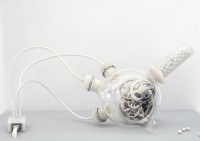REVITAL COHEN
Artificial Biological Clock
source: cohenvanbalen
Revital Cohen and Tuur Van Balen run a London based experimental practice that operates on the border between art and design.
They produce fictional objects, photographs and videos exploring the juxtaposition of the natural with the artificial.
Inspired by designer species, composed wilderness and mechanical organs, they set out to create posthuman bodies, bespoke metabolisms, unnatural animals and poetic machines.
.
.
.
.
.
.
.
source: cohenvanbalen
The promises posed by new reproductive technologies such as IVF, test tube babies and egg freezing, are blurring perceptions of the reproductive cycle amongst women, and consequently, the age of conception is constantly being challenged.
The female body clock relies on moonlight to regulate the menstrual cycle. The use of artificial light and contraceptive hormones, along with the growing pressure to develop a career, are distorting the body’s reproductive signals. The artificial biological clock compensates for this increasingly lost instinct.
This object acts as constant reminder of the temporary and fragile nature of fertility. Given to a woman by her parents or partner, it reacts to information from her doctor, therapist and bank manager via an online service. When she is physically, mentally and financially ready to conceive the object awakes, seeking her attention.
.
.
.
.
.
.
.
source: ct4ct
Revital Cohen is a designer and Royal College of Art Design Interactions graduate whose work examines the relationships and possibilities between medical machines, animals, and humans.
Cohen recently attained a Masters in Design Interactions from the Royal College of Art in London, which followed a BA in Contemporary Furniture Design from Buckinghamshire New University. As a designer and researcher she develops critical objects and provocative scenarios exploring the juxtaposition of the natural with the artificial. Her work spans across various media and includes collaborations with scientists, animal breeders and medical consultants.
Revital Cohen’s Artificial Biological Clock (2008) is a clock-like device that responds to online information from a woman’s doctor, therapist and financial advisor. It is designed to remind modern women when they are fertile and emotionally and economically ready to conceive. It is an examination of how contemporary life can disconnect us from our instincts and the natural rhythms of our bodies.
According to Cohen:
The promises posed by new reproductive technologies such as IVF, test tube babies and egg freezing, are blurring perceptions of the reproductive cycle amongst women, and consequently, the age of conception is constantly being challenged. The female body clock relies on moonlight to regulate the menstrual cycle. The use of artificial light and contraceptive hormones, along with the growing pressure to develop a career, are distorting the body’s reproductive signals. The artificial biological clock compensates for this increasingly lost instinct. This object acts as constant reminder of the temporary and fragile nature of fertility. Given to a woman by her parents or partner, it reacts to information from her doctor, therapist and bank manager via an online service. When she is physically, mentally and financially ready to conceive the object awakes, seeking her attention.
.
.
.
.
.
.
.
source: crepilosfancoccoblogspot
Un progetto di tesi che ha alla base una forte innovazione tecnica, dove protagonista è l’elettronica. La sensoristica è utilizzata per monitorare dei dati, valutarli e successivamente scegliere l’intervento migliore. Avvertire un’allarme e prestare soccorso fa pensare alla probabiltà che un rapido e corretto aiuto possa salvare una vita… È richiesto un lavoro di precisione e in questo l’apporto del design è fondamentale, perchè si devono perfezionare, dove possibile, processi conosciuti e noti. Non un semplice re-design, ma un’attività di cambiamento, un’innovazione che deve migliorare la qualità della vita di tutti noi.
Lo scopo della mia tesi è ridefinire un Sistema contenente il rapporto tra Monitoraggio, Telesoccorso e le persone: come cambia il sistema nei luoghi e quali oggetti sono interessati?
Il Sistema si sviluppa attorno ad un dispositivo portatile personale ed è interessante esprimere nel progetto tutte le potenzialità dell’oggetto.
Monitoraggio e Telesoccorso sono termini relativi al concetto di sistema e relativi al concetto di emergenza (emergenza sistemica).
Un progetto di design for complexity che rispetta il design sostenibile, non solo come tema attento all’ecologia, ma interessante per l’aspetto sociale ed etico.
Questa tesi offre la possibilità di ripensare anche al termine Monitoraggio: dal latino monitor – oris, derivato di monere, con il significato di ammonire, avvisare, informare, consigliare; il sistema deve indirizzare il Monitoraggio in una nuova ottica progettuale “for all”. È questo il mio punto di partenza: le persone hanno diverse esigenze e capacità, si deve progettare un “sistema diverso” che sappia adattarsi a tutti.
.
.
.
.
.
.
.
source: z33be
De kritische objecten en provocatieve scenario’s ontworpen door Revital Cohen situeren zich op en verkennen de tweedeling natuurlijk-artificieel. In haar praktijk, die vele vormen aanneemt, werkt Cohen vaak samen met wetenschappers, bio-ethici, dierenopvoeders en medici. Revital Cohen kreeg voor haar werk verschillende prijzen en erkenningen van o.a FactoryDesign, Helen Hamlyn Centre, Science Museum Emerging Artist Commission en Icon Magazine. Haar werk wordt internationaal voorgesteld en gepresenteerd in verschillende contexten, van wetenschappelijke en academische conferenties tot kunstgaleries en designbeurzen.


